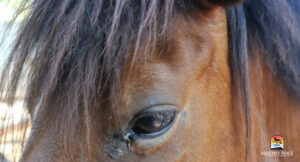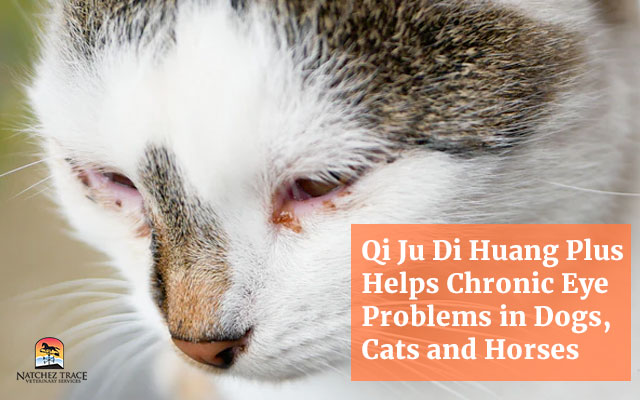As pet owners, we want the best for our furry friends. We shower them with love, care, and attention, ensuring they’re happy and healthy. However, just like us, our beloved dogs can sometimes face health challenges, and one area of concern often arises is their eyes. In this beginner’s guide, we’ll embark on a journey to explore chronic eye problems in dogs, demystifying the topic and shedding light on what you need to know.
Imagine your dog’s eyes as tiny windows to their soul, allowing them to see the world in all its glory. But sometimes, those windows can encounter obstacles, leading to chronic eye problems.
When we say “chronic,” we mean ongoing or recurring. It’s like having a visitor who overstays their welcome!
It’s important to remember that our furry friends can’t speak up and tell us when something’s wrong, so it’s up to us to be their voice and help them through these challenges.
 Additionally, we will explore chronic eye problems in dogs, cats, and horses, including factors like genetics, environment, infections, injuries, and breed-specific conditions. Moreover, we’ll cover how to identify them and the steps you can take to ensure optimal dog eye health.
Additionally, we will explore chronic eye problems in dogs, cats, and horses, including factors like genetics, environment, infections, injuries, and breed-specific conditions. Moreover, we’ll cover how to identify them and the steps you can take to ensure optimal dog eye health.
By the end, you’ll be equipped with the knowledge to help your four-legged companion see the world clearly and comfortably. So, let’s get started.
Factors That Contribute to Chronic Eye Problems in Dogs, Cats, and Horses
Various factors can contribute to chronic eye problems in dogs. Understanding these factors can help us identify and address the underlying causes of our furry friends’ eye issues. Let’s take a closer look at some of the key factors involved:
- Genetics: Like humans, dogs can inherit certain eye conditions through their genes. Some breeds are more prone to specific eye problems, so they must know any breed-specific predispositions.
 Environmental Factors: Dogs are exposed to various environmental elements that impact their eye health. These can include allergens, pollutants, dust, chemicals, and even sun ultraviolet (UV) radiation.
Environmental Factors: Dogs are exposed to various environmental elements that impact their eye health. These can include allergens, pollutants, dust, chemicals, and even sun ultraviolet (UV) radiation.- Infections: Dogs can develop eye infections caused by bacteria, viruses, or fungi. If left untreated or the underlying cause isn’t addressed, these infections can lead to chronic problems.
- Injuries: Accidents or injuries, such as scratches, foreign objects in the eye, or trauma, can result in long-term eye problems if not promptly addressed by a veterinarian.
- Breed-Specific Conditions: Certain dog breeds are more susceptible to specific eye conditions. For example, brachycephalic breeds (short-nosed breeds) may be prone to eye irritations and infections due to their unique facial structure.
Understanding these contributing factors will empower you to recognize potential risk factors for chronic eye problems in dogs. Early detection and timely intervention are crucial in maintaining your pet’s eye health.
How to Identify Chronic Eye Problems in Dogs and Steps You Can Take to Relieve the Condition
Early detection and appropriate care are vital for chronic eye problems in dogs. Here are some key signs to watch for and steps you can take to alleviate the condition:
 Watch for Signs: Pay attention to the following signs that may indicate a chronic eye problem:
Watch for Signs: Pay attention to the following signs that may indicate a chronic eye problem:
- Excessive tearing or discharge
- Redness or inflammation
- Squinting or rubbing the eyes frequently
- Cloudiness or opacity in the eyes
- Changes in pupil size or shape
- Excessive blinking or sensitivity to light
- Consult a Veterinarian: If you notice any of the above signs or suspect a chronic eye problem, it’s crucial to consult a veterinarian promptly. A professional evaluation will help identify the underlying cause and guide appropriate treatment for chronic eye problems in dogs.
- Maintain Proper Hygiene: Regularly clean your dog’s eyes with a veterinarian-recommended eye cleanser or warm water to remove debris or discharge. Ensure you use a soft, clean cloth or cotton ball to avoid causing any irritation.
- Avoid Irritants: Take preventive measures to protect your dog’s eyes from irritants. This can include keeping them away from smoke, dust, chemicals, or other substances that may harm their eyes.
- Follow Medication and Treatment Plans: If your veterinarian prescribes medication or recommends specific treatment, follow their instructions diligently. Administer any prescribed eye drops, ointments, or oral medications as directed and complete the full course of treatment.
 Protect from Sun Exposure: Like humans, dogs can be sensitive to the sun’s harmful UV rays. Consider using dog-specific UV-protective goggles or ensuring your dog can access shaded areas outdoors, particularly during peak sunlight hours.
Protect from Sun Exposure: Like humans, dogs can be sensitive to the sun’s harmful UV rays. Consider using dog-specific UV-protective goggles or ensuring your dog can access shaded areas outdoors, particularly during peak sunlight hours.- Take Eye Supplements: See your furry friend’s eyes sparkle again! Discover Qi Ju Di Huang, a unique herbal formula designed to support your dog’s eye health and combat chronic eye conditions. This all-natural formula is great for your pup’s eyes and supports clear vision and optimal eye function.
Remember, every dog is unique, and treatment approaches may vary based on the specific condition diagnosed by a veterinarian.
By being observant, seeking professional guidance, and providing appropriate care, you can help alleviate dogs’ chronic eye problems and improve overall eye health.
What Is Qi Ju Di Huang?
Chronic eye problems in dogs are nuanced. But don’t worry—we have a solution that may help restore pet eye health. Qi Ju Di Huang is a carefully crafted herbal formula to support and enhance your beloved pet’s eye health.
With its natural ingredients and thoughtful formulation, this powder aims to nourish your pet’s eyes and potentially benefit them.
 Qi Ju Di Huang is formulated to address common chronic eye problems in dogs, such as cataracts, glaucoma, and dry eyes. It contains herbs that aim to protect your pet’s delicate eyes from potential damage caused by disease.
Qi Ju Di Huang is formulated to address common chronic eye problems in dogs, such as cataracts, glaucoma, and dry eyes. It contains herbs that aim to protect your pet’s delicate eyes from potential damage caused by disease.
What sets this natural blend apart is its holistic approach to eye health. Drawing on the principles of Eastern medicine, this formula aims to promote balance and harmony within your pet’s body. It specifically focuses on supporting the kidneys and liver, as these organs are believed to play a role in maintaining healthy eyes.
Incorporating it into your pet’s daily routine offers potential support for clearer vision and optimal eye function.  While it’s important to note that supplements are not a cure-all, Qi Ju Di HuangQi Ju Di Huang may provide additional care for your pet’s eyes alongside proper veterinary attention and care.
While it’s important to note that supplements are not a cure-all, Qi Ju Di HuangQi Ju Di Huang may provide additional care for your pet’s eyes alongside proper veterinary attention and care.
Qi Ju Di Huang is only available with veterinary authorization, so consult your veterinarian to see if it’s a good fit. They can provide personalized guidance based on your pet’s needs and health condition.
Western Medical Indications for Qi Ju Di Huang
Discover how Qi Ju Di Huang can potentially benefit your pet’s eye health. Here are the Western medical indications for incorporating this supplement into your furry friend’s routine:
- Supports chronic eye problems in dogs such as cataracts, glaucoma, and dry eyes.
- Provides essential nutrients and antioxidants to promote optimal eye health.
 Aims to protect the eyes from damage caused by free radicals and oxidative stress.
Aims to protect the eyes from damage caused by free radicals and oxidative stress.- May help improve vision and maintain overall eye function.
- Complementary approach to veterinary care for addressing chronic eye conditions.
- Targets the underlying causes and symptoms of chronic eye problems.
- Natural support for promoting clearer vision and reducing eye discomfort.
Eastern Medical Indications for Qi Ju Di Huang
Explore the holistic approach of Qi Ju Di Huang based on Eastern medicine principles. Here are the Eastern medical indications for incorporating this supplement into your pet’s routine:
- Supports kidney and liver health, which are believed to be connected to eye health in Eastern medicine.
- Aims to promote balance and harmony within the body, including the eyes.
- It nourishes the kidneys and liver to enhance eye health poetentially.
- Addresses the underlying imbalances that may contribute to chronic eye problems in dogs.
- Based on the principles of Traditional Chinese Medicine (TCM) for supporting overall well-being.
- Offers a holistic approach to supporting canine eye health in line with Eastern medical philosophy.
- May help maintain clear vision and reduce discomfort associated with eye conditions.
How Does Qi Ju Di Huang Help Chronic Eye Problems in Dogs, Cats, and Horses?
At Natchez Trace Veterinary Services, Dr. Smith offers an Eastern exam (TCVM) in combination with the standard veterinary exam.
 Traditional Chinese Veterinary Medicine (TCVM) philosophy differs greatly from our standard Western medical philosophy. TCVM focuses on balance and finding the root cause of health challenges rather than simply masking symptoms with prescription medicines.
Traditional Chinese Veterinary Medicine (TCVM) philosophy differs greatly from our standard Western medical philosophy. TCVM focuses on balance and finding the root cause of health challenges rather than simply masking symptoms with prescription medicines.
Through Eastern examination techniques, Dr. Smith chooses herbal blends to treat the underlying causes of your pet’s symptoms.
Qi Ju Di Huang is only one of the many TCVM herbal blends available for Dr. Smith to choose from based on the Eastern exam results.
Qi Ju Di Huang is a specially formulated herbal blend. These herbs work synergistically to alleviate the symptoms of chronic eye problems in dogs while addressing the underlying causes.
What Are the Main Herbs in Qi Ju Di Huang?
It’s no wonder why Qi Ju Di Huang is gaining popularity in the veterinary industry. It includes potent natural ingredients to support and improve your pet’s eye health.
Each carefully selected ingredient in this supplement contributes to the overall well-being of your furry friend’s eyes:
- Rehmannia Root (Shu Di Huang): This traditional herb is known for its nourishing properties. It supports kidney and liver health, which are believed to be closely linked to eye health in traditional Eastern medicine. By nourishing these organs, Rehmannia root aims to promote clear vision and overall eye function.
 Chinese Yam (Shan Yao): Chinese Yam is a nutrient-rich ingredient packed with antioxidants. These antioxidants help protect the eyes from damage caused by free radicals and oxidative stress. By providing a natural defense against harmful factors, Chinese Yam helps maintain the health and integrity of the delicate eye tissues.
Chinese Yam (Shan Yao): Chinese Yam is a nutrient-rich ingredient packed with antioxidants. These antioxidants help protect the eyes from damage caused by free radicals and oxidative stress. By providing a natural defense against harmful factors, Chinese Yam helps maintain the health and integrity of the delicate eye tissues.- Cornus Fruit (Shan Zhu Yu): Cornus Fruit has long been used in traditional medicine for its potential benefits for kidney and liver function. By supporting these organs, cornus fruit indirectly improves eye health and addresses chronic eye conditions.
- Poria Mushroom (Fu Ling): Poria Mushroom is valued for promoting balance and harmony within the body. Poria Mushroom aims to support overall well-being, including eye health, by addressing underlying imbalances.
- Alisma Rhizome (Ze Xie): Alisma Rhizome is known for its diuretic properties and potential to support kidney function. By promoting healthy kidney function, Alisma Rhizome helps maintain the body’s fluid balance, which can positively impact eye health.
These ingredients work synergistically to provide comprehensive support for dog eye health. Incorporating this supplement into their routine may help promote clearer vision and overall eye well-being. As always, consult your veterinarian before introducing new supplements to your pet’s regimen.
Our clients have seen wonderful improvements in the health conditions of their pets after using herbal blends to treat a variety of health issues.
Please contact our clinic anytime if you have questions about herbal remedies!
Conclusion
In conclusion, chronic eye problems in dogs can significantly impact the quality of life for our beloved pets. Whether it’s cataracts, glaucoma, or dry eyes, finding practical solutions to support their eye health is crucial. While proper veterinary care remains essential, incorporating natural supplements can offer additional support and potential benefits.
By combining proper veterinary attention, a healthy diet, regular exercise, and natural supplements like Qi Ju Di Huang, you can take proactive steps to combat chronic eye problems in dogs, cats, and horses.
 Remember to observe any changes in their eyes, such as excessive tearing, cloudiness, or redness, and consult your veterinarian promptly for a thorough evaluation.
Remember to observe any changes in their eyes, such as excessive tearing, cloudiness, or redness, and consult your veterinarian promptly for a thorough evaluation.
Investing in your pet’s eye health is investing in their overall well-being and happiness. By providing them with the best possible care, you can help them enjoy a better quality of life and potentially maintain their precious eyesight for years.
Remember, our furry friends rely on us as their advocates and caretakers. With knowledge, awareness, and the right resources, we can help them navigate the challenges of chronic eye problems and ensure they have the best chance at a brighter and clearer future.








